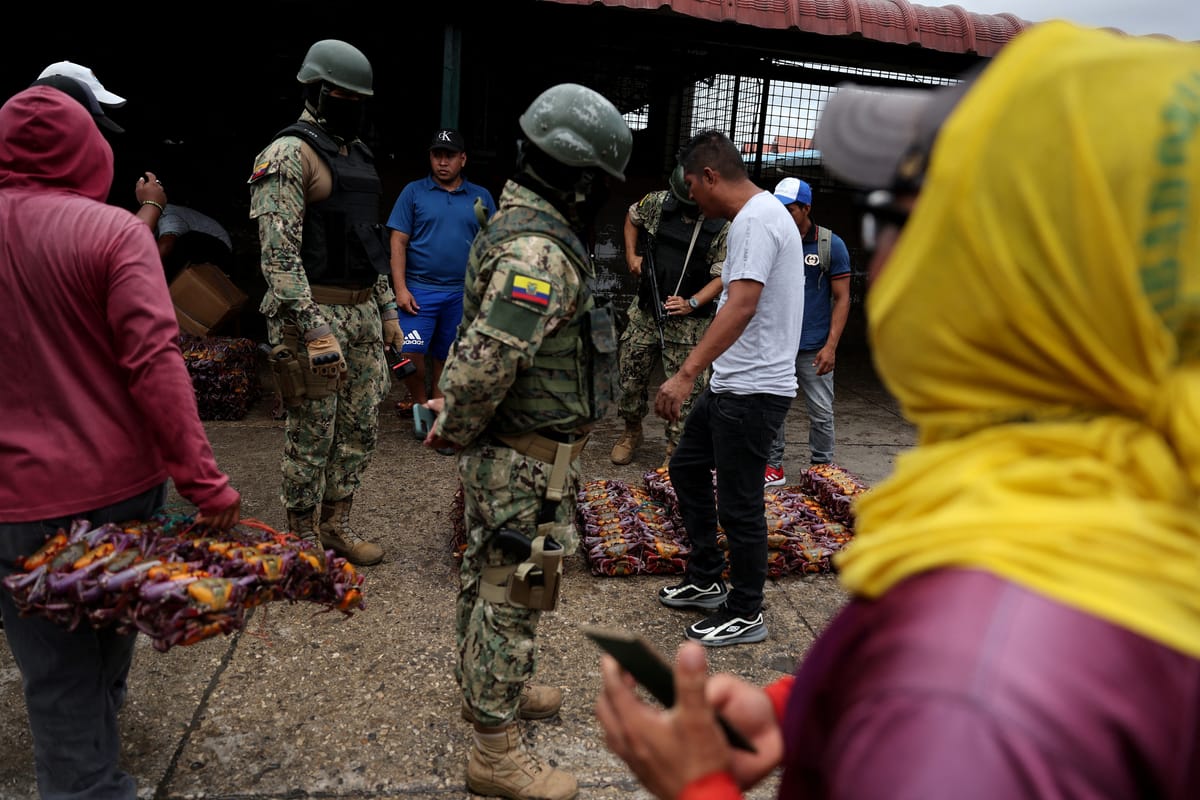Ecuador in crisis: the country’s war on armed gangs linked to drug cartels
Ecuador, a major player in banana and oil exports, has been grappling with escalating gang violence.

A few minutes every morning is all you need.
Stay up to date on the world's Headlines and Human Stories. It's fun, it's factual, it's fluff-free.
The backstory: Ecuador, a major player in banana and oil exports, has been grappling with escalating gang violence. Historically, Ecuador played a key role in keeping the peace between Colombia and Peru, the two largest cocaine producers in the world, acting as a buffer zone. But recent violence, fueled by clashes among drug cartels and domestic gang rivalries, changed the situation. Ecuador went from being a peacemaker to a hotspot, with many of its local gangs having ties with drug cartels.
The heart of this conflict lies in the struggle for control over cocaine routes to lucrative markets in the US and Europe. The tipping point came on January 7 when an attempt to transfer the leader of the Los Choneros gang, Adolfo Macias, known as "Fito," triggered widespread prison riots. When police arrived to transfer him, he wasn’t there. It’s not clear exactly when he escaped, but two guards have been charged with helping him get away. Responding to this, President Daniel Noboa declared a 60-day state of emergency and curfew after Fito's escape.
More recently: Then, on Tuesday, armed individuals stormed TC Television in Guayaquil on live air, raising tensions and resulting in two people injured before the police detained the men involved in the attack. It’s not clear if the TV studio incident is directly linked to Fito's disappearance.
Building on the intensifying security concerns, President Noboa on Tuesday labeled 22 gangs as terrorists and military targets, giving orders to “neutralize” them. On Wednesday, Noboa declared Ecuador at war with these criminal gangs. Car bombings, shootings and prison riots around the country have so far resulted in at least 15 people being killed, and more than 150 people are still being held hostage.
The development: Worries about potential spillover effects have made nearby countries take precautions. Peru quickly sent police to its border with Ecuador to maintain stability, while Colombia announced more military presence along its nearly 600-kilometer border.
On the global front, the US condemned the "brazen attacks" and offered to assist Ecuador. In response to what President Noboa called an "internal armed conflict," China temporarily halted public services at its embassy and consulates in Ecuador. China voiced support for Ecuador's efforts to restore social stability and urged a quick return to normalcy. Other countries have warned their citizens against travel to Ecuador.
Key comments:
“We are at war, and we cannot cede in the face of these terrorist groups,” Ecuador’s President Daniel Noboa told radio station Canela Radio on Wednesday.
"The Foreign Ministry has instructed its embassy and consulates in Ecuador to immediately launch emergency response mechanisms for consular protection," said Chinese spokeswoman Mao Ning.
"In Ecuador, we have never seen this kind of thing, where a channel has been practically hijacked, and a broadcast starts with shootings, with kidnappings," said Francisco Rosas. "So what kind of security situation are we in? And if a television station is capable of receiving this type of robbery, this type of insecurity, imagine restaurants or shops."
“You declared a state of emergency. We declare police, civilians and soldiers to be the spoils of war,” read a terrified police officer at gunpoint after being kidnapped by attackers.
“We are making every effort to recover all the hostages,” said President Daniel Noboa. “We are doing everything possible and the impossible to get them back safe and sound.”
“These delinquents can be certain that we will not hesitate for a single second when it comes to protecting our citizens … If we have to lay down our lives to defend the population we’ll do that,” said Navy spokesperson Marcelo Gutiérrez.




Comments ()